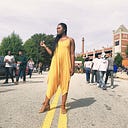Member-only story
Why Black People Love Paramore

Most of my memories of music and finding new genres of music at a young age all began on a school bus, in a shared seat. A friend or boy I liked shared an earbud with me and I was sucked into a world of music unknown to me. In this case, it was Emilia Ruiz, one of my closest friends in middle school who introduced me to Rebelde, pozole and a love alternative rock music that clings to me. I found the soundtrack of my childhood with a innocence and fervor that I still hold dearly.
Paramore, the 2004 grammy awarded American rock band from Franklin, Tennessee was the beginning for a lot of Black kids struggling through middle school and suffering the trials of existing as a tween. Members Hayley Williams, Zac Farro, Taylor York and past members gave us the soundtrack to the middle space between youth and adolescence. Black kids like myself who felt too black to go to warped tour but knew every lyric. Through a decade of music and five albums, Paramore was an entry point for many us to be weird, emotional and find the lost roots of rock and alternative music that has always excluded Black folks.
For me, it began a freefall into alternative, rock and emo music that broke me out of the confines of hip-hop and in some ways brought more emotional space than other genres. As a confused, frustrated and quiet 13-year-old, Paramore, Fall Out Boy, Green Day, Blink 182 and Panic At The Disco gave validity to the feelings I had but couldn’t articulate.
From the angsty glory of Misery Business, the maturity of their album Brand New Eyes and the color of chaos of that is Self Titled, most of my own heartbreaks have been healed by the crooning of frontwoman and icon Hayley Williams. I felt a connection to the uncomfortable and visible growing pains of the band in their music.
I think that’s the reason Black people love Paramore, it’s the nostalgia and collective growth. Paramore grew as we did and its music was just as honest, vulnerable and scared as all of us. Something that I’m assuming a generation of black kids growing up in the late 2000’s needed. While I hadn’t been as aware of Paramore’s break up in most recent years I came back to the group in the most destined way. I had left college for a semester and was very lost, alone and unsure of anything in my life. Paramore released After Laughter in 2017, an…
